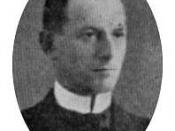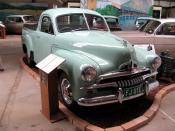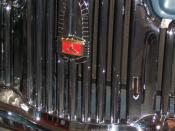J.D. Salinger's The Catcher in the Rye interprets the adolescent world full of trials and tribulations. A boy named Holden Caulfield is faced with many societal and psychological obstacles, as he struggles to find a rational console in society. The urbanity which Holden describes is realistic, yet twisted in his perplexed stupor.
Holden faces the dilemma of questioning where he belongs, if he is abnormal, and who he truly is. In most respects, Holden is a typical teenager. He tries to find himself while struggling to survive the friction of maturing. Like many teens, Holden struggles to gain acceptance and make friends. One of the first traits that Holden reveals about himself is his ability to lie. "I'm the most terrific liar you ever saw in your life. It's awful. If I'm on my way to the store to buy a magazine, even, and somebody asks me where I'm going, I'm liable to say I'm going to the opera.
It's terrible" (16). Jollyroger.com stated, that Holden's inability to have a normal conversation or relationships shuns him from his peers. Holden's insecurity causes his compulsive lying. This, in turn, is why he can't find a place in society. The world doesn't know Holden just as Holden does not know himself. Holden can no longer decipher between reality and his elaborate exaggerations.
The rejection that Holden faces from society directly correlates with his behavior. To compensate for having no friends his own age, Holden looks to older and younger people. Even though immature, Holden tries to act like an adult by smoking and drinking in hopes that he will find companionship or at least spark conversation. When this approach fails, he goes to the polar opposite. "(Phoebe) was always someone you felt like talking to on the phone" (66). Holden has high regards for his little sister in a world of 'phonies', where her innocence, naivety, and imprudence are comforting, yet an idealistic image. Holden is immature; this causes him to find comfort in talking to a younger person. Phoebe is also, the only person that will listen to him, let alone not reject his presence. This, in itself, is enough reason for Holden to have such a strong bond with his younger sibling. Even she, however, worries about Holden's meaningless existence. Thus proving, Holden's little sister may have more intuition than he, who never hesitates to critique with the insight of a philosopher.
During Holden's journey, while searching for life's answers, he becomes infatuated by a question of the duck's fate in Central Park's freezing lake. He actually cares about the ducks of Central Park and what their destiny holds. "Well, you know the ducks that swim around in it? Do you happen to know where they go in the wintertime, by any chance?" (81). Holden forms a mental union with the ducks while contemplating them. Not so ironically, the duck symbolizes Holden. He can follow them with uncertainty, while he continually doubts himself. They, like Holden, disappear without anyone knowing or caring. No one understands Holden, and they have no interest in his anxieties.
Symbolism surrounds Holden as he wanders the streets of New York City, pondering the ducks in the lake, to his failed attempt at having a pleasant time with Sally Hayes. Holden's problems relate to his personality traits which he lets the reader discover on their own. Comparison between the happenings in the life of Holden Caulfield to a much more universal level of feeling, emotion, and thought is constantly present. Rather than the ducks, the museum is the focal point of connection between Holden and his ideals. The Random House College Dictionary gives the definition of a museum to be a building or place where works of art or other objects of a permanent value are kept and displayed. The key word in the definition is permanent. Holden said that, "the best thing, though, in that museum was that everything always stayed right where it was. Nobody'd move. You could go there a hundred thousand times, and that Eskimo would still be just fishing those two fish, the birds would still be on their way south, the deers would still be drinking out of that water hole, with their pretty antlers and their pretty, skinny legs, and that squaw with the naked bosom would still be weaving the same old blanket. Nobody'd be different. The only thing that would be different would be you. Not that you'd be so much older or anything. It wouldn't be that, exactly. You'd just be different, that's all." (p.121). Holden finds security in those things that stay constant, just like the ducks of Central Park; insecurities force him to clutch on to anything while searching for contentment. The museum is one of those things that Holden knows will remain exactly as he remembered it. In a world of questions, tribulations, and phonies, the fact that the museum and all of its exhibits will stay as they are, is one of the things that Holden can keep as a constant in his reality as well as his romantic world.
Museums are assembled with a collection of replicas, deceased life forms, and artifacts. Holden struggles with being himself, because he tries too hard to be innocent, while masking his true identity with accusations of others. There is a relationship between the museum and Holden. Essentially, both Holden and the museum are artificial. As already explained, the museum contains many fabricated replicas and lifeless items. Holden, too, is false. He brags about deception in the first half of the book, then goes on to prove his fabrication. Most of Holden's thoughts and actions are dishonest. The narration is the only way to decipher between Holden's honest and dishonest allegations. The characters however, do not know when he was lying. Throughout the book, Holden goes about making many false relationships and bluntly lying to others. He is no more real than the wax figures, to any of the people he meets. In that sense, Holden is like the museum where he finds sanctuary from the world. One is separated from the world by a pane of glass, the other by a wall of lies. Until Holden learns to be himself, and accept others for who and what they are, he will not be able to find companions, answers, or honest maturity.





